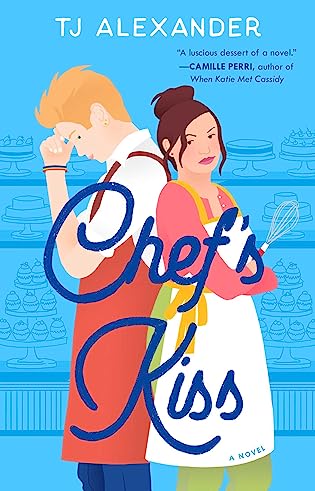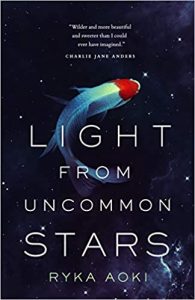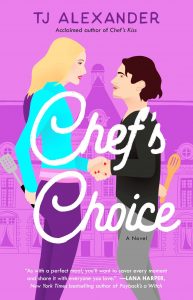 Chef's Kiss (Chef's Kiss, #1) by T.J. Alexander
Chef's Kiss (Chef's Kiss, #1) by T.J. Alexander Format: paperback
Source: publisher
Formats available: paperback, ebook, audiobook
Genres: contemporary romance, queer romance, romantic comedy
Series: Chef's Kiss #1
Pages: 308
Published by Emily Bestler Books on May 3, 2022
Purchasing Info: Author's Website, Publisher's Website, Amazon, Barnes & Noble, Kobo, Bookshop.org, Better World Books
Goodreads
A high-strung pastry chef’s professional goals are interrupted by an unexpected career transition and the introduction of her wildly attractive nonbinary kitchen manager in this deliciously fresh and witty queer rom-com.
Simone Larkspur is a perfectionist pastry expert with a dream job at The Discerning Chef, a venerable cookbook publisher in New York City. All she wants to do is create the perfect loaf of sourdough and develop recipes, but when The Discerning Chef decides to bring their brand into the 21st century by pivoting to video, Simone is thrust into the spotlight and finds herself failing at something for the first time in her life.
To make matters worse, Simone has to deal with Ray Lyton, the new test kitchen manager, whose obnoxious cheer and outgoing personality are like oil to Simone’s water. When Ray accidentally becomes a viral YouTube sensation with a series of homebrewing videos, their eccentric editor in chief forces Simone to work alongside the chipper upstart or else risk her beloved job. But the more they work together, the more Simone realizes her heart may be softening like butter for Ray.
Things get even more complicated when Ray comes out at work as nonbinary to mixed reactions—and Simone must choose between the career she fought so hard for and the person who just might take the cake (and her heart).
Note from Amy: I realized as I was writing this that I’ve been gone from these pages since the beginning the COVID-19 pandemic; my last review was for Melanie Yaun’s PsyTek. In the early days of the pandemic, just weeks after that review was posted, we lost Melanie, so the rest of that story, sadly, is lost to us, as is her brilliant work at our shared day job, her joyous wit, and her dear, dear friendship. In the time since then, I’ve not been as much of a reader or writer as I have been in the past. But the subject of today’s post, perhaps, marks a turning point for me, where I can get back at the keyboard.
Guest Review by Amy: Two people, who get a crush on each other and spend most of the book circling around that fact through an assortment of tribulations, until one of them apologizes and says they’ll never mention it again, and the other says, “wait, what?” and they ride off into the sunset together. Tropey as it comes, right? That’s the basic recipe for a rom-com, isn’t it?
 When I saw a queer romance, involving a chef, I was all-in. I love to cook (ask Marlene!) and I love queer romance almost as much as I love sci-fi. If there’s ever a queer romance set on a spaceship involving the ship’s cook, I may spontaneously combust. (Marlene’s comment: Ryka Aoki’s marvelous Light from Uncommon Stars is more cooking than cheffing, but there’s a spaceship and a queer romance and donuts and it’s marvelous. I’ll be prepared to pick up your pieces if you combust upon reading.)
When I saw a queer romance, involving a chef, I was all-in. I love to cook (ask Marlene!) and I love queer romance almost as much as I love sci-fi. If there’s ever a queer romance set on a spaceship involving the ship’s cook, I may spontaneously combust. (Marlene’s comment: Ryka Aoki’s marvelous Light from Uncommon Stars is more cooking than cheffing, but there’s a spaceship and a queer romance and donuts and it’s marvelous. I’ll be prepared to pick up your pieces if you combust upon reading.)
Escape Rating: A+: One of the things that makes a whole lot of romances work is that they draw the reader – usually a female – into identifying with the – usually a female – protagonist. It’s a formula that has driven Harlequin’s success since before Marlene or I were born. But what happens when the reader is not drawn into the world of the protagonist from whose eyes we are seeing the story, but to their love interest? In my case, that is what happened in Chef’s Kiss. Our protagonist, and the lens through which we see author TJ Alexander’s New York City setting, is Simone, a trained chef, who works at a fairly staid old media company producing recipes in a test kitchen. She’s happy with her situation; it’s her dream job! Sure, it doesn’t pay as well as it could, perhaps, but the magazine has been losing subscriptions for a while now, because 21st century, you know…
Other reviewers, and indeed, the book’s back cover, call Simone “high-strung,” but to my eyes, that is kind of a cheap shot, as no one calls her that between the covers of the book, and I’m just not seeing that. She’s a bit uptight, perhaps, something of a perfectionist, and rather resistant to change, certainly. So when the publisher of the magazine calls her in and tells her their whole business model is changing to creating video content, and then she discovers that the long-time kitchen manager has been replaced by a much younger and more energetic person who is going to change literally everything in her orderly world, she is, to put it mildly, kind of agitated about it. I get that, and I don’t think that classifies as “high-strung.” She’s just behaving…well, like I might, in her shoes. And I’m not high-strung. Am I? (Marlene’s comment: No, you’re not. Or I am too and we’re NOT going there because cheap shot is still cheap.)
It doesn’t take long, of course, until the bisexual Simone falls for the tall, good-looking and energetic new soul in the kitchen, though – Ray is super-cute, enjoys wearing a leather apron, and looks really good in it. But they’re just colleagues, you know…then, just friends, of course…
The publisher’s video guy accidentally posts a clip of Ray being hilarious and awesome on the magazine’s channel, and it goes viral, and all of a sudden, the strategy for media is changed, and Simone and Ray are co-hosting a hit show on YouTube, much to the chagrin of the company’s arrogant social media manager. Things rock on pretty well, until…
Okay, I’m going to have to level with you here. I’m not an unbiased reader; Ray is non-binary, tending toward masculine, and I’m non-binary, tending feminine. When Ray comes out at work, they have mixed results. While Simone and the other kitchen staff are supportive, management (including that snooty social media maven) are not, continually dead-naming and misgendering them. And Ray tells their allies in the kitchen to not make a fuss, because they cannot lose this job – and when we as readers are informed of why, when Ray tells Simone, my heart just broke for them.
Yes, this story is a rom-com. And yes, it’s got all the classic elements of one – the not-quite-understanding each other’s subtexts, the “I said things when I was drunk” night, the “we’ll never mention this again.” But there is a second story here, and it’s one that Simone shows us in some pretty sharp detail – Ray’s struggle for their identity and acceptance. Simone is there for Ray, as they are Going Through It, tending to them through what – for both Ray, and for me – are some of the toughest moments of their life. Ray’s path, because it mirrors my own, resonated forcefully with me, even though the details of their path are quite a bit different from my own. It’s the same struggle, really: the struggle to be themselves. It is a struggle I have lived with for over a decade now, and seeing Ray’s life through Simone’s eyes brought me back to some of the difficult moments of that period.
Simone is going through her own struggle, too, being a mostly-closeted bisexual woman, and when she outs herself to her manager (in the discussion over Ray’s coming-out), you see her own frustration with the struggle she sees coming. It’s not on the scale of Ray’s, but it’s there, and we get to see her respond to that in a really rewarding way when she points out to her boss that “You’re the only straight person in the room.”
 Cisgender and/or straight readers might not get that resonance, and for those readers who don’t, this is still a fantastically cute, sassy, well-crafted rom-com with a little steam and some great food for thoughtful reflection. If you’re one of those readers, that’s okay, though this reviewer’s hope is that seeing Ray and Simone’s struggles educate you a bit, and give you a better feeling for those people around you who may not fit in the same mold you do. For queer folk and their allies, though, there’s so much more to see and feel here. My one gripe about this book is that the ending came too quickly, the resolution a little bit deus ex machina for my tastes – the happy-for-now ending came quite abruptly, even though it was a good end to the tale. This was TJ Alexander’s first work, and I am going to read their second work, the follow-on Chef’s Choice, right away. I’m hungry for more.
Cisgender and/or straight readers might not get that resonance, and for those readers who don’t, this is still a fantastically cute, sassy, well-crafted rom-com with a little steam and some great food for thoughtful reflection. If you’re one of those readers, that’s okay, though this reviewer’s hope is that seeing Ray and Simone’s struggles educate you a bit, and give you a better feeling for those people around you who may not fit in the same mold you do. For queer folk and their allies, though, there’s so much more to see and feel here. My one gripe about this book is that the ending came too quickly, the resolution a little bit deus ex machina for my tastes – the happy-for-now ending came quite abruptly, even though it was a good end to the tale. This was TJ Alexander’s first work, and I am going to read their second work, the follow-on Chef’s Choice, right away. I’m hungry for more.




